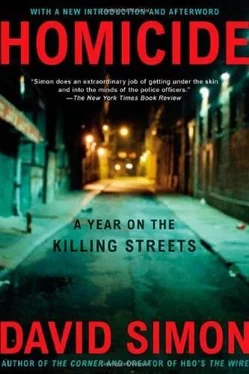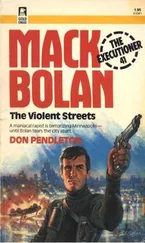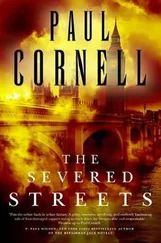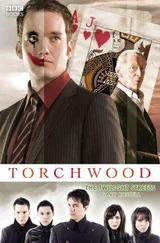Yolanda was followed by others, by McLarney testifying about the crime scene and Gary Tuggle, one of the two detail officers, testifying to the search for a suspect. Young, black, attractive, Tuggle was a necessity for this jury-a racial counterweight to Butchie Frazier, a subtle suggestion to black jurors that the system itself wasn’t altogether white. Then came the couple who had been walking south on Appleton Street from the corner bar, both of whom recounted the same shooting scenario as Yolanda, though both testified that they were too far away to identify the gunman. Still, they confirmed Yolanda’s account.
Finally, there was the kid from the City Jail, another murder defendant who had quarreled with Butchie when both were in pretrial detention. Butchie had told him about the shooting, offering details that only the shooter could know.
“What else did the defendant tell you?” asked Schenker.
“He said the police was roughing him up, so he pulled out his gun and shot him in the head. He said he wished he would have killed the bitch.”
The ultimate ghetto insult, it hung there in the courtroom for a moment and then fell on dead silence. A young man, blind for life, so casually denigrated by the man who had held the gun. Cassidy. A bitch.
Gary Schenker paused for effect as two jurors shook their heads and Bothe lifted a hand to her mouth. Asked whether he was offered a reduced sentence in exchange for his testimony, the kid shook his head. This, he told the jury, was personal.
“I showed him a picture of my girl,” the kid explained. “He said when he got out he was going to have her.”
That was their case. Everything that could be done had been done before Gene Cassidy made his way to the stand. Cassidy was the emotional kicker, the unspoken appeal to a jury of Butchie Frazier’s peers, a jury that now sits staring at the young man on the witness stand, a young man who cannot stare back. Gene Cassidy is the psychological culmination of the state’s case, the last tug on the jury’s heartstring before the defense takes over.
Already the jury has heard the University of Maryland surgeon describe the path of each bullet in clinical detail and assess the slim chance of anyone’s surviving such wounds. Yet here is Cassidy, back from the grave in his dark blue suit to face the man who failed to kill him.
“Agent Cassidy,” says Bothe, solicitous, “there’s a microphone in front of you… if you could speak into it.”
Cassidy reaches forward and touches the metal.
Schenker then asks the preliminary questions. “Agent Cassidy, how long have you been a Baltimore city police officer…”
As Schenker continues, the eyes of several jurors bounce from Cassidy to Frazier, then back to Cassidy. The two men are close to each other, separated by no more than six feet, and Frazier is staring with genuine curiosity at the side of Cassidy’s head. Jet black hair covers the temple wound, and the facial injuries have healed perfectly. Only the eyes reveal the damage: one blue and vacant, the other translucent and distorted.
“And you are totally blind, correct?” asks Schenker.
“Yes, I am,” says Cassidy. “I’ve also lost my senses of smell and taste.”
It is the most precious kind of testimony. In every murder trial, the victim exists for the jury as an abstract entity, as a part of the process represented by nothing more than an autopsy report and some 3-by-5 crime scene photographs. The defendant, however, remains flesh and blood for the duration of the trial. In the hands of a competent defense attorney, his humanity is better displayed than the inhumanity of the crime, his ordinariness is more apparent than the extraordinary acts of which he is accused. A good defense attorney sits close to his client, touches him on the shoulder to get his attention, puts an arm around him to show the jurors that he likes this man, that he believes in him. Some lawyers go so far as to give defendants mints or hard candies, telling clients to pull them out at a quiet moment and offer one to the lawyer, perhaps even to the prosecutor, seated a few feet away. See, ladies and gentlemen, he’s human. He likes mints. He can share.
But Gene Cassidy denies Butchie Frazier the advantage. In this courtroom he, too, is flesh and blood.
Schenker continues: “On that particular evening, what if anything do you recall…”
Cassidy grimaces slightly before answering. “I have no recollection of the incident… the shooting,” he says slowly. “The last thing I remember is being at my father-in-law’s house in Pennsylvania earlier that afternoon.”
“Can you recall going to work that day?”
“I know that I must have,” says Cassidy. “But I can’t remember anything after my father-in-law’s house. They tell me that’s pretty common with these kinds of injuries-”
“Officer Cassidy,” asks Bothe, interrupting. “I take it that’s your wife who escorted you to the stand.”
“Yes, your honor.”
“And by the look of things,” the judge says, unwilling to let the moment pass, “I would say that she’s expecting…”
“Yes. Due on the Fourth of July.”
The Fourth of July. The defense attorney shakes his head.
“Is this your first child?” asks the judge, glancing toward the jury box.
“Yes it is.”
“Thank you, Officer Cassidy. I was curious.”
The beleaguered defense counsel has nowhere to go. What do you do with the testimony of a blinded police officer whose pregnant wife waits on a nearby bench? What do you ask on cross examination? Where do you make your points? Where, in such a scene, do you find a place for your client to breathe?
“No questions, your honor.”
“The witness is excused. Thank you, Agent Cassidy.”
Out in the corridor, McLarney watches the double doors open at the recess. The jurors are already upstairs in the jury room, Bothe is already back in chambers. Patti walks out with Gene on her arm, followed by Schenker.
“Hey, Gene, how’d it go?” asks McLarney.
“Okay,” says Cassidy. “I think I was good. What’d you think, Patti?”
“You were great, Gene.”
“What did Butchie do? Did he look at me?”
“Yeah, Gene,” says a friend from the Western. “He was staring right at you.”
“Staring? Was he eyefucking me?”
“No,” says the officer. “He just looked real strange, you know.” Cassidy nods.
“You hurt him, Gene,” says a Western man. “You got him good.”
McLarney claps Cassidy on the back, then walks down the hall with Patti and Gene’s mother and brother, both down from New Jersey for the trial. As the family heads upstairs to the law library to wait out the defense case, McLarney puts a hand on Cassidy’s arm and asks a string of questions about the testimony.
“I wish I could have been in there, Gene,” McLarney tells him on the stairs.
“Yeah,” says Cassidy. “I think I did okay, though. What did you think, Patti?”
Patti Cassidy reassures her husband again, but McLarney is too nervous to be satisfied by one opinion. Minutes later, he’s again pacing the courthouse corridor, buttonholing every lawyer, spectator and sheriff ’s deputy who walks out of Bothe’s court.
“How’d Gene do? What was the jury’s reaction?”
McLarney frowns at every assurance. The cost of following the most important jury trial of your life from a corridor is that you’re never willing to believe what you hear. Cassidy endured months of speech therapy, McLarney reminds the others. Did he hear the questions? How was his speech?
“He did great, Terry,” says Schenker.
“What’d Butchie do?” asks McLarney.
“He just kept staring at him,” says a Western man. “He kept staring at the side of Gene’s face.”
Читать дальше












